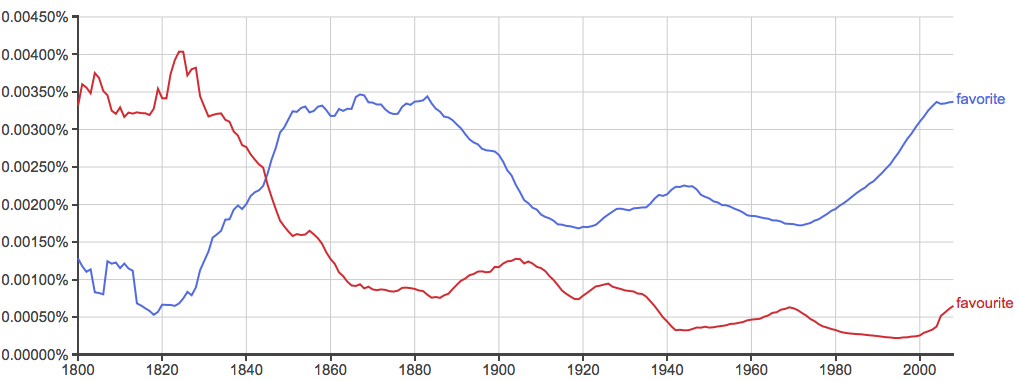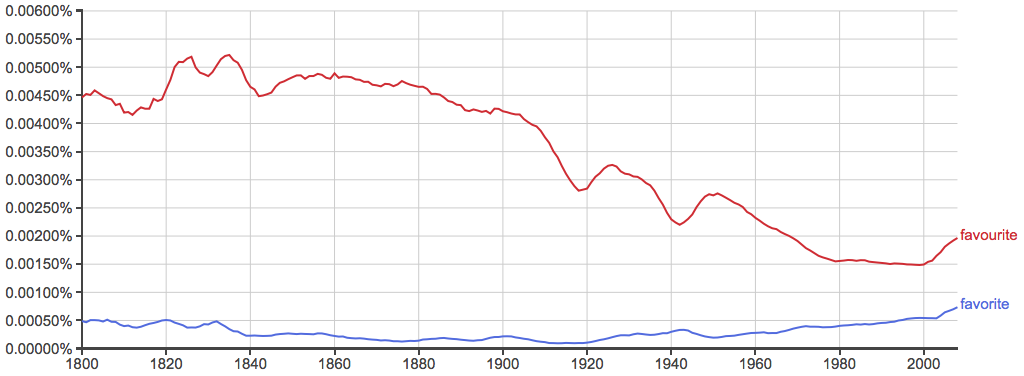American writers and British writers spell some words differently, even when they mean the same thing. You can see these disparate spellings any time you read American and British publications. An article in The Wall Street Journal, for instance, might contain the word favorite, while an article in The Economist might contain the word favourite.
Many times, these spelling differences are the result of different standardization at the editorial level. As languages evolve, these standards can and do change, as well.
As a writer yourself, you will have to choose between these two variants when you use the word. Neither is incorrect, but there are definitely situations where favorite is preferable to favourite, and vice versa. The difference, like in so many writing dilemmas, comes down to your intended audience.
So, how should you spell favorite in your writing? Let’s find out.
What is the Difference Between Favorite and Favourite?
In this post, I will compare favorite vs. favourite. I will outline when these spellings are appropriate and showcase how they are used in example sentences, so that you can see them in context.
Plus, I will show you a helpful mnemonic device that will help you choose either favourite or favorite for your own writing.
When to Use Favorite
 What does favorite mean? Favorite is an adjective. Favorite describes something which is preferred above all others.
What does favorite mean? Favorite is an adjective. Favorite describes something which is preferred above all others.
Here are some examples,
- Geraldine’s favorite food is pizza, but she will never say no to hot wings, either.
- Robert has a favorite word, but he cannot repeat it in polite company.
- Dominique’s favorite thing to do on a sunny afternoon is walk her dog in the city park.
- My new favorite heirloom white beans are the small, round Italian purgatory beans, fagioli del purgatorio, which have a tender, creamy texture. –The New York Times
Favorite is the standard spelling of this word in American English.
When to Use Favourite
 What does favourite mean? Favourite is an alternative spelling of the same word. It is the standard spelling in British English. It can be used in all the same contexts as favorite, and carries the same meaning.
What does favourite mean? Favourite is an alternative spelling of the same word. It is the standard spelling in British English. It can be used in all the same contexts as favorite, and carries the same meaning.
For example,
- Bob Baffert, whose Arrogate is the favourite for the $10m Dubai World Cup on Saturday, said here on Wednesday his colt is “the dirt version of Frankel”, the brilliant champion who won all 14 of his races in England in the same green, white and pink colours of Prince Khalid Abdullah. –The Guardian
The following two charts show the relative usage of favourite vs. favorite in American English and British English, respectively, since 1800.


As you can see, favorite has been preferred in American English since shortly before 1850, when it overtook favourite in usage. Favourite has always been preferred in British English.
These charts aren’t exhaustive in their scope, but they do help for identifying long-term trends.
Trick to Remember the Difference
Choosing between favorite and favourite is simple: you must consider your audience.
- For American readers, choose favorite.
- For British readers, choose favourite.
Since favourite contains an extra U, like United Kingdom, this should be an easy decision to make.
Summary
Is it favorite or favourite? Favorite and favourite are alternative spellings of the same word, which refers to something that is preferred above all others.
- Favorite is the American spelling.
- Favourite is the British spelling.
For British audiences, you should use favourite. This is easy to remember, since favourite and United Kingdom are both spelled with the letter U, unlike favorite.
In summary, favorite is the American form of this word. Favourite is the British form.
Contents
